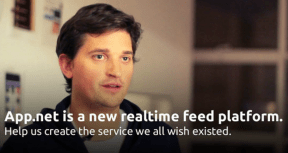So here’s the real story behind App.net founder Dalton Caldwell’s plans to build a new, open API framework for developers to build off of. According to him, Facebook pressured him into selling his company, rather than competing with the social network’s newly released App Center.
In an open letter to Facebook CEO Mark Zuckerberg posted to his blog on Wednesday, Caldwell recounted his side of a meeting with Facebook’s developer relations team, which occurred in mid-June. Prior to the meeting, App.net was working on a mobile app that would let users see which apps their friends were using, and make suggestions about new apps to download. It used Facebook Connect and Facebook Open Graph to identify interesting apps and to share them with social connections, and Caldwell hoped to get “executive-level support” for his upcoming product launch. But then something interesting happened:
“The meeting took an odd turn when the individuals in the room explained that the product I was building was competitive with your recently-announced Facebook App Center product. Your executives explained to me that they would hate to have to compete with the “interesting product” I had built, and that since I am a “nice guy with a good reputation” that they wanted to acquire my company to help build App Center.”
Basically, the Facebook team present was hoping that Caldwell would agree to an acqui-hire and shut down the app that they had been working on over the previous months. “I told your team I would rather reboot my company than go down that route,” he wrote.
Which is basically what he’s done. Caldwell announced last month that he was looking to re-focus App.net on building a “real-time feed API and service” that would provide an open platform for developers to build on, kinda like Github. It would also essentially compete with Facebook and Twitter — development platforms that rely on ad revenue and sometimes release new features that compete with apps created by third-party developers.
Take Twitter, for instance: It recently released clickable stock tickers called Cashtags, an idea that StockTwits had implemented four years ago.
But anyway, back to Facebook and Caldwell’s meeting. Part of the reason he says he’s upset is that his experience of receiving a hardball acqui-hire offer isn’t unique, that he’s learned from other startups and Facebook employees is that it’s “part of a systematic M&A ‘formula.'” That is, it’s has been telling startups that, rather than be steamrolled when creating competing products, they should work for Facebook instead.
Which, he believes, is all the more reason why developers need a new framework that isn’t tied to the financial incentives of companies like Twitter or Facebook. There’s just one problem: Things aren’t looking good for Caldwell’s alternative platform. Nearly three weeks ago, he sought $500,000 in backing to get the project started. With just 12 days to go, join.app.net has only hit about 25 percent of its goal.
It’s not clear what Caldwell will do if the goal isn’t met — in an email, he said he’s got no idea, but still has cash in the bank. Mixed Media Labs, App.net’s parent company, raised $5 million from Andreessen Horowitz in December 2010.
Here’s a video interview with Caldwell on the new venture, which he recorded a few weeks ago:
